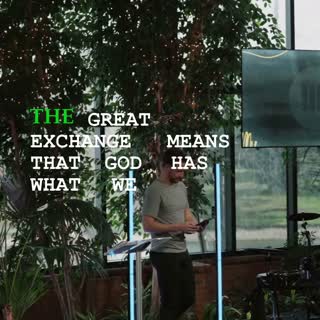Embracing Grace: The Gospel and Isaiah 53
Devotional
Sermon Summary
Bible Study Guide
Sermon Clips
"Every single week we show up, we aspire to be a Holy Spirit-led church. And so we're constantly asking God, God, what is it you want to say? What is it you want to do?" [00:00:59] (8 seconds)
"Two thousand years ago, Jesus came as a suffering servant. He died for the sins of the people. And then Jesus didn't stay dead. He was resurrected, ascended to heaven. He's now ruling and reigning at the right hand of the Father." [00:07:44] (13 seconds)
"Isaiah 53 contains arguably the clearest and most important messianic prophecy. And when I say Isaiah 53, I'm referring to all of Isaiah 53 in the last three verses of Isaiah 52." [00:10:12] (14 seconds)
"This chapter contains everything. Everything you need to come to the saving knowledge of Jesus Christ. If you had one chapter in the entire Bible to read, to understand who Jesus is, what he did, what we have access to in him, I would argue Isaiah 53 is it." [00:13:12] (16 seconds)
"Surely he took up our pain and bore our suffering. Yet we considered him punished by God, stricken by him, and afflicted. But he was pierced for our transgressions. He was crushed for our iniquities. The punishment that brought us peace was on him. And by his wounds, we are healed." [00:21:00] (19 seconds)
"The great exchange means that God has what we need, but we don't deserve. Which is righteousness. God is completely righteous and we're not. We have what God hates and rejects, which is sin. And so there's a problem when it comes to us relating to God." [00:21:35] (18 seconds)
"A genuine church of Jesus Christ. We receive salvation not because we're good or we've earned it. We receive it because God is good and because he earned it. Hallelujah. In a cult, behavior is the goal. Behavior is the focus. In a church of Jesus Christ, behavior is not the goal. It's the fruit. Following Jesus is the goal." [00:24:36] (21 seconds)
"You and I were created to live and operate in the environment of grace. That God is good. Everything he does is good. And everything I do to him is not to earn his favor or earn his love or earn his salvation. It's because I am loved and I have his salvation." [00:33:24] (14 seconds)
"Our good works are a response to God's grace. They are not a requirement for it. And freedom comes when you stop performing, and you start trusting." [00:35:36] (11 seconds)
Ask a question about this sermon
"Two thousand years ago, Jesus came as a suffering servant. He died for the sins of the people. And then Jesus didn't stay dead. He was resurrected, ascended to heaven. He's now ruling and reigning at the right hand of the Father." [00:07:44] (13 seconds)
"Isaiah 53 contains arguably the clearest and most important messianic prophecy. And when I say Isaiah 53, I'm referring to all of Isaiah 53 in the last three verses of Isaiah 52." [00:10:12] (14 seconds)
"This chapter contains everything. Everything you need to come to the saving knowledge of Jesus Christ. If you had one chapter in the entire Bible to read, to understand who Jesus is, what he did, what we have access to in him, I would argue Isaiah 53 is it." [00:13:12] (16 seconds)
"Surely he took up our pain and bore our suffering. Yet we considered him punished by God, stricken by him, and afflicted. But he was pierced for our transgressions. He was crushed for our iniquities. The punishment that brought us peace was on him. And by his wounds, we are healed." [00:21:00] (19 seconds)
"The great exchange means that God has what we need, but we don't deserve. Which is righteousness. God is completely righteous and we're not. We have what God hates and rejects, which is sin. And so there's a problem when it comes to us relating to God." [00:21:35] (18 seconds)
"A genuine church of Jesus Christ. We receive salvation not because we're good or we've earned it. We receive it because God is good and because he earned it. Hallelujah. In a cult, behavior is the goal. Behavior is the focus. In a church of Jesus Christ, behavior is not the goal. It's the fruit. Following Jesus is the goal." [00:24:36] (21 seconds)
"You and I were created to live and operate in the environment of grace. That God is good. Everything he does is good. And everything I do to him is not to earn his favor or earn his love or earn his salvation. It's because I am loved and I have his salvation." [00:33:24] (14 seconds)
"Our good works are a response to God's grace. They are not a requirement for it. And freedom comes when you stop performing, and you start trusting." [00:35:36] (11 seconds)


















